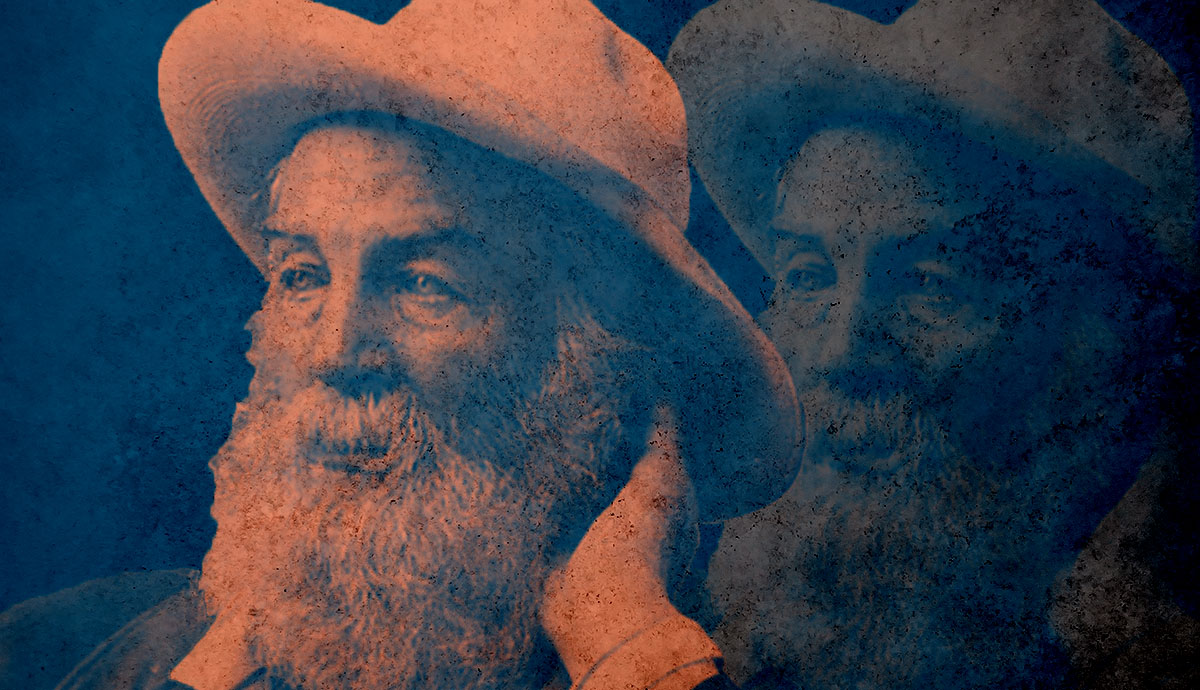Every Atom | No. 160
Introduction to Every Atom by project curator Brian Clements
When Whitman closes the 1855 section that later became “Song of Myself” with the promise that he is “waiting for you,” he refuses the convention of ending that phrase with a period, generating the sense of an opening rather than an ending. This is only the latest of many remarkable “you”s in the poem, a word Whitman uses with precision, drama, and cunning. Unlike anyone else before him, he transfixes his reader, recognizing them and allowing them to realize that they are being recognized. This can be threatening—as one student once put it, “Whitman gave me Stockholm syndrome”—but it is also thrilling to be called out by him, an experience of a peculiar form of attention, in between the erotic and the innocent (what Christopher Ricks identified in Keats as the pleasure of “embarrassment”).
Whitman’s creation in his reader of such an intimate “youness” was unprecedented, but then resonated virally throughout culture, finding particularly effective utterance in rock, when Jimi Hendrix asks if you are experienced or Johnny Rotten whether you ever got the feeling you’ve been cheated. Whitman shared this capacity for asking questions that strike hard at how you perceive of your relationship to the world, with all the dark charisma that revealers-of-buried-truths enjoy. Yet there is another side to how Whitman draws you into his confidence, which is given ample demonstration in the passage I want to talk about.
When this reader read “Song of Myself” for the first time as a teenager in Northern Ireland in the 1980s, it was another use of “You” which confirmed Whitman’s peculiar glamour, when he describes a day of work and camaraderie at the shore and then insists that “You should have been with us that day round the chowder-kettle.” At this time, I did not even know what chowder was, and so the word was one of several in Leaves of Grass that exert what Adorno called the exogamous pleasure of strange vocabularies. Nor did I know that chowder derives from the French “chaudère,” a term that can mean a pot, a furnace, or a boiler, but nevertheless got some of its heat, not to mention its smell. Few poets are as thoroughly aromatic as Whitman, but he also gives the temperature of a thing, its touch and its strangeness.
The peculiar hospitality that Whitman urges upon “You” rounds back to the hospitality that the boatmen and clamdiggers had originally shown by stopping for him. Their welcome is different in tone to what Whitman offers, however; “You should have been with us” has a complex urgency. You should have been there, because you should not miss out on experiences such as this; you should have been there because Whitman wants you to have been there; and you should have been there because you should feel the need to be there. If you were not there, then what were you doing? You feel incomplete, because you have yet to figure out how to be there; and you feel hungry, because that chowder must taste amazing. In all of this, Whitman is asking for your trust, because the quality of the experience is a matter of his testimony.
The 1871 edition reads “(You should have been with us that day round the chowder-kettle)” using punctuation to affirm its parenthetical intimacy. It is a reminder of how Walt Whitman is a great poet of the aside, and that he was anxious to bring the reader into a kind of dramatic space in which a fictive friendship might feel realizable. Nobody understood better how the I-You relationship could generate theatrics, as in the melodrama of “To You,” which first appeared in 1860:
LET us twain walk aside from the rest;
Now we are together privately, do you discard ceremony,
Come! vouchsafe to me what has yet been vouchsafed to none—
Tell me the whole story,
Tell me what you would not tell your brother, wife, husband, or physician.
For all that the poem might be read as a variation upon the theme of forbidden love, its last word reads and feels like a punchline, and reminds us of how Whitman also anticipates the wit of other New Yorkers to come, a proto-Larry David. On top of everything else that is going on in “Song of Myself,” Whitman is a grand comedian. As Randall Jarrell put it “when Whitman says, ‘I dote on myself, there is that lot of me and all so luscious,’ we should realize that we are not the only ones who are amused.” His good-humoured gang around the chowder-kettle are like figures from Breughel’s peasant suppers, celebrants of conviviality, jovial Americans you should want to meet.
Recommended
Nor’easter
Post-Op Appointment With My Father
Cedar Valley Youth Poet Laureate | Fall 2024 Workshop







